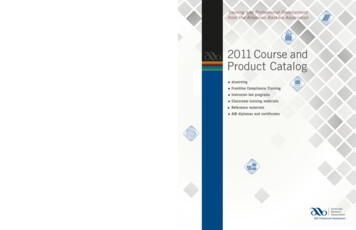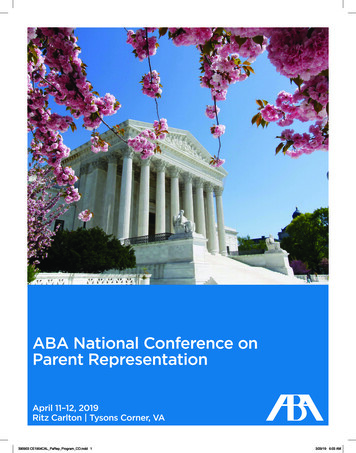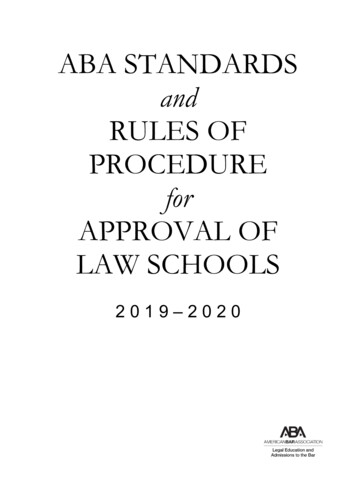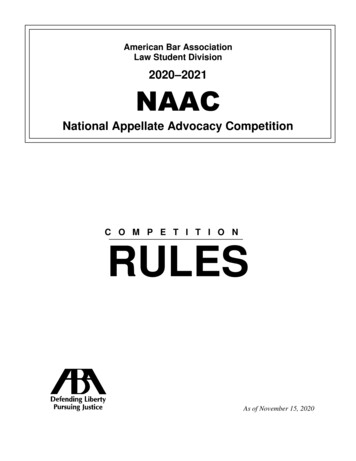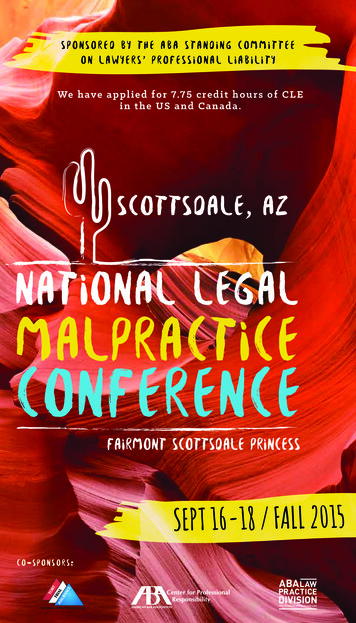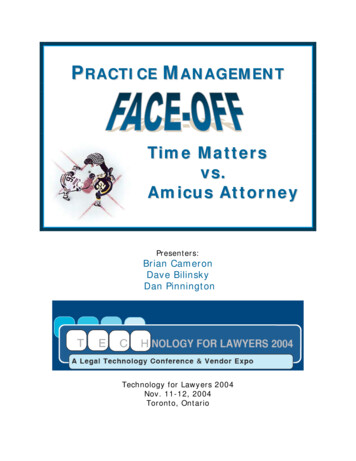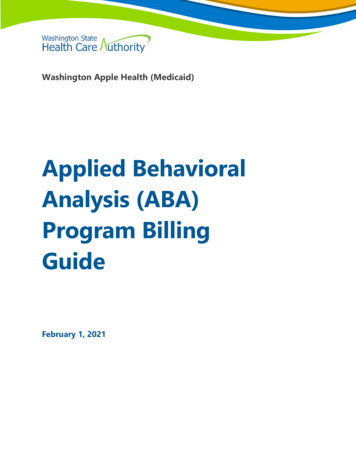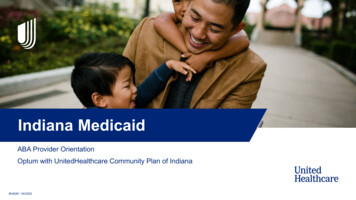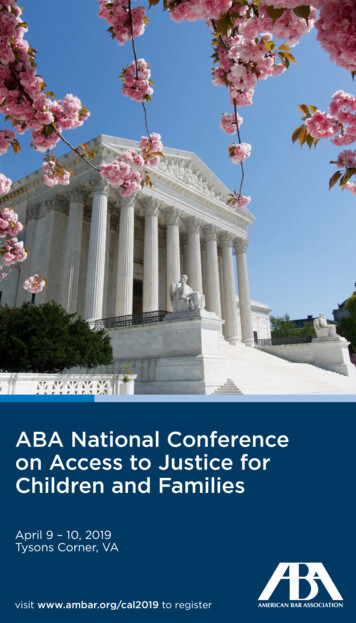
Transcription
ABA National Conferenceon Access to Justice forChildren and FamiliesApril 9 – 10, 2019Tysons Corner, VAvisit www.ambar.org/cal2019 to register
ABA National Conference on Accessto Justice for Children and FamiliesApril 9 – 10, 2019 Ritz Carlton Tysons Corner, VADescriptionJoin us for the ABA Center on Children and the Law Spring 2019 National Conferencesdesigned to train, engage, and provide opportunities for networking and dialogue amongchild law professionals who practice in a variety of areas.National Conference on Access to Justice for Children and Families, April 9-10The conference will provide training and networking opportunities for child law professionalswho advocate for children, parents, agencies, and kin in child welfare proceedings. Theconference also includes participation from judges, Court Improvement Program Directors,court administrators, and attorneys who handle cases that intersect with child welfare suchas in immigration, education, housing and family law. This year, the conference will include atrack on implementing the Family First Prevention Services Act in practice.National Conference on Parent Representation, April 11-12Hosted by the Center on Children and the Law and the National Alliance for ParentRepresentation, this event is designed for attorneys who represent parents, judges, CIPDirectors and court administrators, parents, social workers, and other child welfare systemprofessionals who focus on parent advocacy. The workshops, facilitated small groupdiscussions, and plenary sessions on relevant topics will move the parent representationpractice forward and improve outcomes for children and families.Register Today!For the best value, register before February 282019 EarlyBird Rate2019 RegularRateOne Conference 399 460Both Conferences 750 830 75 75One Conference PreConf Only 470 520One Conference 150 150Both Conferences 250 250EventNon-MemberPreconference OnlyStudentThe ABA reserves the right to correct all typographical errors. Fees do not include travel or lodging.Earn up to29.7 CLE Creditswith 3.6 Ethics CreditsNot an ABA Member?Join Now!www.ambar.org/join
FacultyACCESS TO JUSTICESusan AbramsTim DeckerCarlyn HicksChildren’s Law Centerof CaliforniaMonterey Park, CASocial Innovation PartnersBowie, MDMission First Legal Aid OfficeJackson, MSBill DelisioEliza HirstDanny AliceaColorado State CourtAdministrator’s OfficeDenver, CODelaware Office of the ChildAdvocateWilmington, DEMarguerite DowningCathy Hollenberg SerretteLos Angeles Superior CourtMonterey Park, CACircuit Court for PrinceGeorge’s County, MarylandUpper Marlboro, MDCenter for FamilyRepresentationNew York, NYTina AmberboySupreme Court of TexasChildren’s CommissionAustin, TXStephanie BarclayBrigham Young UniversityLaw SchoolJProvo, UTPrudence Beidler CarrABA Center on Childrenand the LawWashington, DCDarneshia BellZERO TO THREEWashington, DCAna BeltranGenerations UnitedWashington, DCW. Warren BinfordWillamette UniversityCollege of LawSalem, ORMorgen Black-SmithSupport Center forChild AdvocatesPhiladelphia, PACarol CaseyCook County Public GuardianCHICAGO, ILAshley ChaseColorado Office of theChild’s RepresentativeDenver, CORonnie CheungChildren’s Law Centerof CaliforniaBUENA PARK, CALily ColbyCalifornia CASAOakland, CACristina CooperABA Center on Childrenand the LawWashington, DCKathleen CreamerCommunity Legal Servicesof PhiladelphiaPhiladelphia, PAPlanning CommitteeMike DsidaChildren and Family LawDivision, Committee for PublicCounsel ServicesBoston, MAKaren HowzeGregory EngleNicole JohnsonKidsVoicePittsburgh, PAABA Center on Children andthe LawWashington, DCBetsy FordyceNational Council of Juvenileand Family Court JudgesReno, NVRocky Mountain Children’sLaw CenterDenver, COAisha JonesSheri FreemontRebecca Jones GastonCasey Family Programs ICWADenver, COMaryland Department ofHuman ResourcesBaltimore, MDCristina F. FreitasCook County Public GuardianChicago, ILJamie JulianFreitas & Freitas, LLPLowell, MAChildren’s Hospital of LosAngelesLos Angeles, CADebbie F. FreitasFreitas & Freitas, LLPLowell, MATiffany KellLee GelerntACLU Immigrants’ RightsProjectNew York NYJenifer Goldman FraserZero to ThreeWashington, DCZERO TO THREEWashington, DCDavid KellySpecial Assistant to theAssociate Commissioner at theU.S. Children’s BureauWashington, DCKristin KellyErnestine S. GrayOrleans Parish Juvenile CourtNew Orleans, LAAllison GreenMissouri Children’s DivisionJefferson City, MOJami HagemeierWilliams & Hagemeier, PLCDes Moines, IALeslie HeimovChildren’s Law Center ofCaliforniaMonterey Park, CAConnie Hickman TannerNational Council of Juvenileand Family Court JudgesReno, NVABA Center on Children andthe LawWashington, DCEva KlainABA Center on Children andthe LawWashington, DCSherry LachmanFoster AmericaSan Francisco, CAAnne Marie LancourABA Center on Children andthe LawWashington, DCMimi LaverABA Center on Children andthe LawFaculty subject to change without notice.
Washington, DCKathleen McNaughtAnthony SimpsonAlexandra LohrbachABA Center on Children andthe LawWashington, DCJuvenile Law CenterPhiladelphia, PAAisha McWeayThe Bail ProjectVenice, CANational Disability RightsNetworkWASHINGTON, DCJerry MilnerThaddius Smith-BoydAssociate Commissioner at theChildren’s BureauWashington, D.C.Baltimore, MDAnnie E. Casey FoundationBaltimore, MDIra LustbaderChildren’s Rights, Inc.New York, NYRandi MandelbaumRutgers Law School ChildAdvocacy ClinicNewark, NJChristina McClurg RiehlCalifornia Department ofJusticeSan Diego, CAGabriella McDonaldTexas AppleseedAustin, TXMaura McInerneyEducation Law CenterPhiladelphia, PAKathleen McNaughtABA Center on Children andthe LawWashington, DCJerry MilnerAssociate Commissioner at theChildren’s BureauWashington, D.C.Felicity NorthcottFelicity NorthcottInternational Social ServicesBaltimore, MDCrys O’GradyMuseum of ToleranceLos Angeles, CARaumak RahmaniChildren’s Law Center ofCaliforniaMonterey Park, CAHeidi Redlich EpsteinABA Center on Children andthe LawWashington, DCJennifer RenneABA Center on Children andthe LawWashington, DCAlexandra G. RoarkCrys O’GradyCommittee for Public CounselServices, Children and FamilyLaw DivisionBoston, MAMuseum of ToleranceLos Angeles, CAAlfrieda Robinson-DawkinsInternational Social ServicesBaltimore, MDDiane Smith HowardChristina K. SorensonJuvenile Law CenterPhiladelphia, PAMarlies SpanjaardThe EdLaw ProjectBoston, MADylan Spencer MoenchSupreme Court of TexasChildren’s CommissionAustin, TXSheldon Spotted ElkCasey Family Programs ICWADenver, COStefanie SprowChildren’s Defense FundWashington, DCAriella StafansonCalifornia CASASacramento, CAJeffrey SterbencCook County Public GuardianCHICAGO, ILRobert M. TudiscoBarger & GainesTarrytown, NYMary Van CleveKidsVoicePittsburgh, PABon Secours CommunityWorks/ National Women’sPrison ProjectBaltimore, MDAlpa Jayanti PatelJennifer RodriguezCook County Public GuardianChicago, ILYouth Law CenterSan Francisco, CACook County Public GuardianCHICAGO, ILBrent PattisonMiriam RollinChildren’s Rights Clinic, DrakeUniversity School of LawDes Moines, IAEducation Civil Rights Alliance,National Center for Youth LawArlington, VAEmily PeelerMicah SchwartzmanABA Center on Children andthe LawWashington, DCUniversity of Virginia Schoolof LawCharlottesville, VAJennifer PokempnerRebecca ShaferJuvenile Law CenterENOSBURG FALLS, VTKidsVoicePittsburgh, PAMaura McInerneyJerald A. SharumEducation Law CenterPhiladelphia, PA 19107Arkansas Department ofHuman ServicesLittle Rock, ARKristen OrnatoColumbia Legal ServicesSeattle, WANandilay WalkerEwen Nancy WangStanford UniversityPalo Alto, CATom WelshonceKidsVoicePittsburgh, PAPaul WiseStanford UniversityStanford, CA
AgendaABA NATIONAL CONFERENCE ON CHILDREN & THE LAW:Access to Justice for Children and FamiliesTuesday, April 9, 20198:00 a.m. –9:00 a.m.Registration9:00 a.m. –9:30 p.m.WelcomeWelcome & Introductory RemarksPrudence Beidler Carr, JD, Director of the ABA Center on Children and the LawDr. Jerry Milner, DSW, Associate Commissioner at the Children’s Bureau and theActing Commissioner for the Administration on Children, Youth and Families9:30 a.m. –10:15 a.m.Opening PlenaryTransforming Child Welfare By Bridging Systems And SectorsSherry Lachman, JD, Founder and Executive Director Foster AmericaInnovation often arises at the intersection of systems and sectors. This session willfocus on how we can leverage this recipe for innovation to transform public systemsfor children and families. During this session, we will reflect on existing examples ofgame-changing child welfare innovations that follow this recipe. We will also discussstrategies for strengthening the capacity of public systems to create new innovationsand scale existing ones.10:30 a.m. –12:00 p.m.Workshop Session AReligious And Sexual Orientation Exclusions In Foster CareMicah Schwartzman, JD, University of Virginia School of LawStephanie Barclay, JD, Brigham Young University Law SchoolIn 2018, several high-profile lawsuits and pieces of state and federal legislation addressed religiousand sexual orientation exclusions in the child welfare system that affect public and private agencies,foster parents, children, and families. This session will provide an opportunity to hear from twodifferent viewpoints about the arguments and implications underlying this national debate.Changing The System: Strategies For Front-Line LawyersIra Lustbader, JD, Children’s Rights, Inc.Gabriella McDonald, JD, Texas AppleseedTom Welshonce, JD, KidsVoiceChanging the systems that affect our clients can feel daunting to individual practitioners. Thissession will explore how practitioners can effectuate system-change through individual cases,local partnerships, and larger strategies.Building A Legal Education Advocacy CommunityKristin Kelly, JD, ABA Center on Children and the LawKathleen McNaught, JD, ABA Center on Children and the LawEmily Peeler, JD, MSW, ABA Center on Children and the LawThis session is designed for attorneys with extensive experience advocating for the educationalneeds of students in foster care and those who are just starting to think about how to incorporatebetter educational advocacy into your day-to-day representation of children and families. Thisinteractive session will be an opportunity for participants to share legal strategies, identify ongoingchallenges and trends, and outline a framework for formalizing a national network to supportongoing collaboration.Family First Track: A Courtroom Advocate’s Guide To The Family FirstGalaxyAllison Green, JD, Missouri Children’s DivisionStefanie Sprow, Children’s Defense FundThrough this session attendees will understand Family First as a robust opportunity for courtroomadvocacy, legal innovation, and healthy system transformation. Participants will return to theirhome jurisdiction with increased confidence and urgency to leverage the language and the spirit ofthe law in their daily case practice.Agenda subject to change without notice.
Discussion Group: Expertise And Wellness: Cultivating And Sustaining TheExperienced Children’s Law OfficeCarol Casey, JD, Cook County Public GuardianAlpa Jayanti Patel, JD, Cook County Public GuardianSustaining a cohort of dedicated and professional attorneys in today’s children’s law office requiresa dual commitment. It means not only cultivating subject matter expertise in a variety of fields thatintersect with child welfare, but also creating a space for staff to manage the impact of secondarytrauma. This session will provide children’s law office leaders with an opportunity to exchange ideasabout how to develop and maintain a strong and committed team of staff attorneys.12:00 p.m. –1:30 p.m.Lunch On Your Own1:30 p.m. –3:00 p.m.Workshop Session BImpact Of Parental Incarceration On ChildrenHonorable Cathy Hollenberg Serrette, Circuit Court for Prince George’s County, MarylandAlfrieda Robinson-Dawkins, Bon Secours Community Works/ National Women’s Prison ProjectThaddius Smith-BoydConsideration of the well-being of the child is largely absent in criminal law and policies. More thanfive million children have had a parent who lived with them go to jail. Panelists will discuss thepsychological trauma these children face and suggest what can be done to help, including the useof child impact statements at sentencing.A New Day: How To Make The Most Of Federal Title Iv-E Funding For ChildAnd Parent Counsel In Your Jurisdiction[Speaker announcements coming soon]Client Engagement Skills And The Larger Legal Context In Icwa Cases AndBeyondSheri Freemont, Casey Family Programs ICWAChristina McClurg Riehl, JD, California Department of JusticeSheldon Spotted Elk, Casey Family Programs ICWAPractitioners will learn how to use cultural humility and patience to develop rapport and mutualrespect with clients. This workshop will offer discussion and exercises to fulfill a practitioner’sethical duties, while also discussing current challenges to ICWA in federal court across the country.Presenters will highlight the opportunities ICWA provides to ensure that a child’s interests are bestserved by the child welfare system through advocacy that involves mutual respect.Family First Track: Is “Least Restrictive” The Best We Can Do? SecuringThe “Most Connected” Placement For ChildrenBrent Pattison, JD, Children’s Rights Clinic, Drake University School of LawJennifer Pokempner, JD, Juvenile Law CenterJennifer Rodriguez, JD, Youth Law CenterThough the law requires children separated from their families to be placed in the least restrictivesetting, this does not happen for far too many children and youth. Attendees will discuss practicalresources and current research to reframe our message to advocate for the “most connected”placement for child clients.Discussion Group: Why Robust Kinship Care Policy Is Needed To AddressRace Equity In Foster CareAna Beltran, JD, Generations UnitedMary Van Cleve, JD, Columbia Legal ServicesFamily law has traditionally provided a “private foster care” system inaccessible to those in poverty,whose children end up in foster care. As more children are placed with relatives -- as a preventionstrategy or a permanent plan -- new legal strategies and programs to support relative caregiversare needed. Come discuss kincare reform efforts.3:00 p.m. –3:30 p.m.Networking Break3:30 p.m. –5:00 p.m.Workshop Session CAgenda subject to change without notice.
Ethical Issues In Child Welfare CasesEthics Credit!Jennifer Renne, JD, ABA Center on Children and the LawThis session will explore the challenging ethical issues that play out in unique ways forattorneys representing children, parents, and child welfare agencies. We will cover topics suchas confidentiality, representing clients with diminished capacity, interactions with representedand unrepresented parties, conflicts of interest, and who makes decisions when your client is agovernment agency. Through a series of hypothetical case scenarios, we will examine how theModel Rules of Professional Conduct apply, as we engage in active debate on handling the difficultissues that arise day-to-day. The session will help attorneys develop an increased awareness of howethical issues can shape representation, resulting in better decision-making and advocacy in theface of ethical dilemmas.Cultural Identity In Foster CareLily Colby, JD, California CASACrys O’Grady, JD, Museum of ToleranceAriella Stafanson, California CASAThe workshop will highlight the preliminary findings of the first foster youth cultural identity andaccess survey and its impact on social wellbeing. The audience will walk away with knowledgeabout research, laws, and best practices regarding the importance of cultural identity for children infoster care.Special Education Advocacy In Juvenile Correctional FacilitiesHonorable Marguerite Downing, Los Angeles Superior CourtDiane Smith Howard, JD, National Disability Rights NetworkKathleen McNaught, JD, ABA Center on Children and the LawMarlies Spanjaard, JD, The EdLaw ProjectRobert M. Tudisco, JD, Barger & GainesUsing the Blueprint for Change framework as a guide, this session will discuss broad goals forhow to achieve education stability and success for youth in the juvenile justice system, with aparticular focus on youth with disabilities who are entitled to receive special education and relatedservices. Our expert panel will provide an overview of the IDEA requirements for these studentsand discuss state and education agency responsibilities. The session will also address commoneducational barriers encountered, and recent case law in this area, as well as direct advocacy tips.Topics addressed include FAPE, IEPs, LRE, Child Find and Evaluations, Discipline, Due Process, andReentry to School and Community.Family First Track: Prevention Services – What This Could Mean For TheField In The Longer Term & The Lawyer’s RoleHonorable Ernestine S. Gray, Orleans Parish Juvenile CourtCarlyn Hicks, JD, MBA, CWLS, Mission First Legal Aid Office, Mississippi College School of LawJerald A. Sharum, JD, Arkansas Department of Human Services and American Association ofHealth and Human Services AttorneysThe prevention services component of the Family First Act introduces complex questions forattorneys regarding safety decision-making, due process, reasonable efforts, and judicial review.This session will examine those questions more closely and look at the role of counsel for children,parents, and agencies in ensuring that prevention services are implemented in a way that iscompatible with the child welfare legal system.Discussion Group: High-Quality Legal Representation For Children AndParents: Achieving Justice For FamiliesKathleen Creamer, JD, Community Legal Services of PhiladelphiaLeslie Heimov, JD, CWLS, Children’s Law Center of CaliforniaMimi Laver, JD, ABA Center on Children and the LawThe goal of the Family Justice Initiative (FJI) is to ensure every parent and every child has highquality legal representation when child welfare courts make life-changing decisions about theirfamilies. This discussion will focus on what constitutes high-quality representation and strategiesfor working with an interdisciplinary team to improve outcomes for clients. Participants will discusshow data can be used to support investment and tools for collecting data. Discussion additionallywill address accessing federal dollars to support high-quality representation.5:00 p.m. –6:00 p.m.Conference ReceptionAgenda subject to change without notice.
Wednesday, April 10, 20198:30 a.m. –10:00 a.mWorkshop Session DSupporting Permanency For Older Youth: What’s The Brain Got To Do WithIt?Kristin Kelly, JD, ABA Center on Children and the LawAlexandra Lohrbach, MSW, Annie E. Casey FoundationAnthony Simpson, Youth Advocate, Youth Fostering Change, Juvenile Law CenterChristina K. Sorenson, JD, Juvenile Law CenterThis session will share strategies for achieving and maintaining permanency for older youth that areinformed by adolescent brain development and the experiences and wisdom of current and formeryouth in care. This interactive session is designed to translate adolescent brain science conceptsinto daily practice guidance for legal professionals who work with and support young people.Education Advocacy In The CourtroomMorgen Black-Smith, JD, Support Center for Child AdvocatesEliza Hirst, JD, Delaware Office of the Child AdvocateMaura McInerney, JD, Education Law CenterMiriam Rollin, JD, Education Civil Rights Alliance, National Center for Youth LawThis workshop will focus on specific ways to address the educational needs of children in fostercare through courtroom advocacy, informed decision making, and detailed court orders. Thesession will also address ways to reduce reliance on congregate care placements by improvingeducational services for children in community schools.Legislative Advocacy For Attorney ServicesSusan Abrams, JD, Children’s Law Center of CaliforniaAshley Chase, JD, Colorado Office of the Child’s RepresentativeMike Dsida, JD, Children and Family Law Division, Committee for Public Counsel ServicesWe will discuss successful strategies to advocate at the legislature for attorney services, includingattorney reimbursement rates and agency budgets, as well as advocacy regarding bills impactingthe best interests of children and child welfare attorney representation.Family First Track: From The Greenbook To Family First: Building BridgesAt The Intersection Of Domestic Violence And Child WelfareHonorable Karen Howze (ret.), National Council of Juvenile and Family Court JudgesConnie Hickman Tanner, JD, National Council of Juvenile and Family Court JudgesAchieving safety and well-being for families experiencing domestic violence continues to be achallenge, and professionals have called for elements of child welfare practice that the Greenbook(NCJFCJ 1999) did not fully explore, including the implicit bias and systemic racism impactingfamilies of color, the need for total family engagement (including fathers), and the need for fullerunderstanding of protective factors in these cases. The Family First Act presents courts andcommunities an opportunity to do community-based prevention work to take up these importantissues.Discussion Group: Talkin’ ‘Bout A [Child Welfare] RevolutionTim Decker, Social Innovation PartnersAllison Green, JD, Missouri Children’s DivisionA revolution of new thinking, common purpose, and collaboration bridged the gap betweenagency and attorney disciplines in Missouri. A powerful truth was discovered: if social workers andattorneys are courageous enough to lead a movement together, lives will change for the better andthe promise of these honorable professions will be realized.10:00 a.m.–10:15 a.m.Break10:15 p.m. –11:45 p.m.Workshop Session EAgenda subject to change without notice.
The Collective Power Of Youth: Changing Systems Through Foster-YouthLed OrganizingBetsy Fordyce, JD, Rocky Mountain Children’s Law CenterThis session will focus on the importance of youth organizing as an effective model for systemchange. An initiative of the Rocky Mountain Children’s Law Center and partner of Foster Youth inAction, project Foster Power is a group of current and former foster youth, ages 15 to 25 , workingtogether to improve the Colorado child welfare system. Using this group as an example, this sessionwill examine how legal advocacy organizations can support young people’s collective advocacy atthe grassroots level. This session will also explore opportunities and challenges for legal advocatesin supporting similar work, as well as highlight initial strategies for building youth voice andempowering youth to take action.Best Practices And Effective Advocacy To Overcome Implicit BiasesAgainst Transgender YouthRonnie Cheung, JD, Children’s Law Center of CaliforniaJamie Julian, MSW, Children’s Hospital of Los AngelesRaumak Rahmani, JD, Children’s Law Center of CaliforniaThis session will consider how implicit biases negatively affect transgender youth and assess thesignificance of timely access to appropriate medical and mental health services. We will alsoaddress common terms that transgender youth may use, basic medical management practices fortransgender youth, and best practices to support these youth.Improving Permanency Outcomes For Children And Families Impacted ByTrauma And Serious Adversity: Lessons Learned From Infant-Toddler CourtTeamsDarneshia Bell, ZERO TO THREEJenifer Goldman Fraser, PhD, MPH, ZERO TO THREEJami Hagemeier, JD, Williams & Hagemeier, PLCTiffany Kell, JD, ZERO TO THREEThis workshop addresses effective advocacy for families in the child welfare system in the contextof significant parent trauma histories and risk and children’s urgent developmental need forstable, nurturing care. Presenters will share research findings from infant-toddler court team sitesand strategies for engaging parents and advancing child well-being. The workshop will increaseparticipants’ understanding of how to work effectively with parents affected by trauma andstruggling with difficulties associated with serious adversity, including substance use disorders.Participants will learn about practices for engaging parents that help build family protective factorsand capacities and permanency planning that is both developmentally-informed and familycentered.Conducting Trauma-Informed Interviews Of ChildrenW. Warren Binford, JD, Willamette University College of LawEwen Nancy Wang, MD, Stanford UniversityPaul Wise, MD, MPH, Stanford UniversityChildren involved in child welfare or immigration proceedings are not only likely to be in themidst of an ongoing traumatic experience but also to have been previously exposed to traumaticevents and adverse experiences. As clients, these children are experiencing intense psychologicaldistress that may manifest during interviews or discussions focused specifically on their separation,removal, or immigration experiences. This session is intended to prepare lawyers to conductinterviews that maximize the utility of the information obtained and minimize the risk of unintendednegative consequences. It will provide participants with resources and training on best practices forinterviewing trauma-exposed children.Family First Track: A Tool For The Legal Community In And Out Of TheCourtroomCristina Cooper, JD, ABA Center on Children and the LawAlicia Davis, JD, National Center for State CourtsThe legal community has a critical role to play ensuring key provisions of the Family First Act areimplemented successfully, ranging from residential treatment placements with parents, to extendedreunification services, and Chafee older youth service expansions. This session will provideattorneys and members of the legal community, including judges, court administrators, and CASAswith specific guidance for using the new legislation as a tool to advance children and families’interests and their states’ larger child welfare system goals.12:00 p.m. –12:30 p.m.Conference Lunch and Award PresentationPresentation of the Mark Hardin Award for Child Welfare Legal Scholarship andSystems ChangeAgenda subject to change without notice.
12:30 p.m. –1:15 p.m.Conference PlenaryStill She RisesAisha McWeay, JD, Chief Executive Officer, The Bail Project (recently featured in theNew Yorker Magazine article titled “America’s Other Family Separation Crisis”).In November 2016, Ms. Steinberg launched Still She Rises, a public defender projectin Oklahoma focused on addressing staggering rates of female incarceration andthe carry-over effects on children and families. Ms. Steinberg will share the details ofwhat she and her team have learned in their effort to both address the root causesof female incarceration (including fines and fees policies) and combat its manyconsequences, such as growing strains on the child welfare system, substance use,and supports for kin caregivers.1:30 p.m. –3:00 p.m.Workshop Session FSpotlight On Immigration: Family Separation At The Border And The U.S.Child Welfare System –Completely Distinct Or Inextricably Intertwined?Prudence Beidler Carr, JD, ABA Center on Children and the LawLee Gelernt, JD, ACLU Immigrants’ Rights ProjectRandi Mandelbaum, JD, Rutgers Law School Child Advocacy ClinicIn 2018, an Executive Branch policy of separating children and parents from each other at theBorder introduced new language and questions into the national child welfare dialogue. Thissession will examine connections between family separation at the Border and child welfarelaw. Attendees will come away with information about clear lines of distinction but also detailsabout how the two areas of law connect and why current federal challenges are helping toestablish important precedent on such topics as children and parents’ right to family, proceduraland substantive due process protections in child welfare, and harm incurred from the trauma ofseparation.Social Media Ethics And You: What Child Welfare Professionals Need ToKnowAnne Marie Lancour, JD, MAT, ABA Center on Children and the LawNicole Johnson, JD, MSW, ABA Center on Children and the LawThis interactive session will discuss the impact of social media on clients in child welfare cases.Topics will include: applicable Rules of Professional Conduct, using social media platforms as anattorney, reviewing court and administrative rulings, and evidentiary implications of social media.Bring your smartphones as we discuss privacy settings!Crossover Youth: Marshalling The Data Into PracticeCristina F. Freitas, JD, Freitas & Freitas, LLPDebbie F. Freitas, JD, Freitas & Freitas, LLPAlexandra G. Roark, JD, Committee for Public Counsel Services, Children and Family Law DivisionYouth crossing over from the child welfare system into the juvenile justice system, and vice versa, isa paramount issue confronting our clients. Fueling this crisis is youth placement in congregate care.Learn to challenge reliance on these group home placements by collecting and marshalling data.Family First Track: Family First Act: New Opportunities For Kinship FamiliesAna Beltran, JD, Generations UnitedHeidi Redlich Epstein, JD, MSW, ABA Center on Children and the LawThis session will explore the kinship provisions of the Family First Act: kinship navigator programs,foster home licensing, prevention services, and engagement of family for children in congregatecare. As kinship advocates or legal stakeholders who want to ensure the best possible outcomesfor children, we will collectively explore the benefits of this new law for the kinship triad (parents,kinship caregiver, and children) as well as potential challenges with implementation.Agenda subject to change without notice.
Discussion Group: Moving Towards A System Of Quality Representation:Lessons From 2018 Legal Representation Studies In Texas And CaliforniaTina Amberboy, JD, Supreme Court of Texas Children’s CommissionEva Klain, JD, ABA Center on Children and the LawDylan Spencer Moench, JD, Supreme Court of Texas Children’s CommissionThis Discussion Group will provide i
Join us for the ABA Center on Children and the Law Spring 2019 National Conferences designed to train, engage, and provide opportunities for networking and dialogue among child law professionals who practice in a variety of areas. National Conference on Access to Justice for Children and Families, April 9-10

